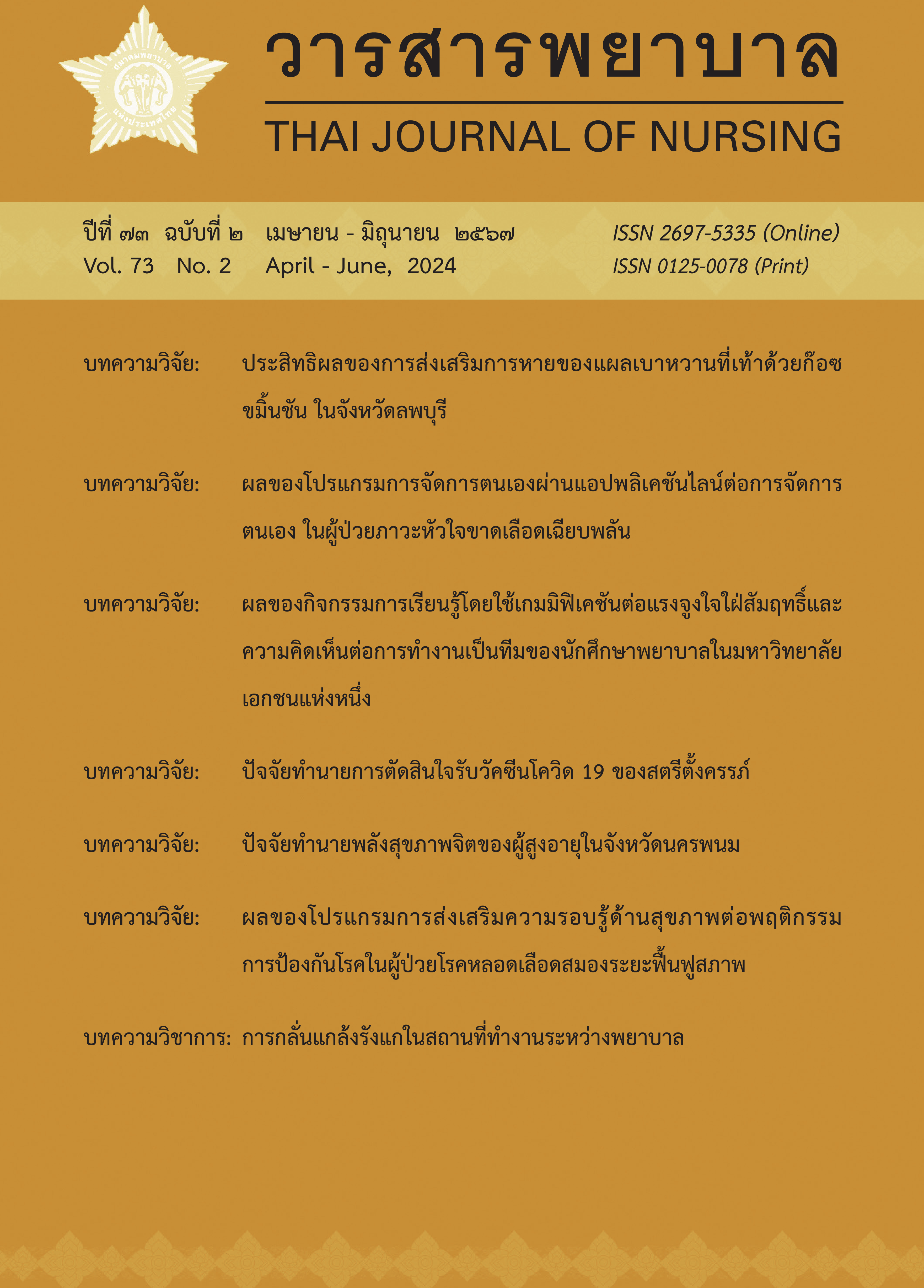The effects of learning activities using gamification on achievement motivation and opinion toward teamwork among nursing students in a private university
Main Article Content
Abstract
The purpose of this quasi-experimental research was to evaluate the effects of learning activities using gamification on achievement motivation and opinion toward teamwork among nursing students in a private university. A sample of 94 nursing students was purposively selected. The research tools were the learning activities using gamification, achievement motivation assessment and a questionnaire on opinion toward teamwork. Their content validity indexes were 0.89, 0.96, and 0.98 respectively. The reliability coefficients of achievement motivation assessment and a questionnaire on opinion toward teamwork, were 0.93 and 0.96 respectively. Descriptive statistics and paired t-test were used in data analysis. The results were that after receiving learning activities using gamification, nursing students had higher achievement motivation than the pre-experiment at p < .01. Moreover, their opinions toward teamwork were at the high and highest levels.
Article Details

This work is licensed under a Creative Commons Attribution-NonCommercial-NoDerivatives 4.0 International License.
References
กิตติทัช เขียวฉะอ้อน และ ธีระวัฒน์ จันทึก. (2560). การทำงานเป็นทีมสู่การเพิ่มประสิทธิผลในการทำงาน. วารสารวิทยาลัยดุสิตธานี, 11(1), 355-370.
ฉันท์ทิพย์ พลอยสุวรรณ, กนกอร พิเดช, สุวารี โพธิ์ศรี, และฐานิตา พึ่งฉิ่ง. (2563). ปัจจัยที่มีผลต่อแรงจูงใจใฝ่สัมฤทธิ์ทางการเรียนของนักศึกษาพยาบาล คณะพยาบาลศาสตร์ มหาวิทยาลัยหัวเฉียวเฉลิมพระเกียรติ. วารสารการพยาบาลและการศึกษา, 13(1), 97-113.
ชนัตถ์ พูนเดช และ ธนิตา เลิศพรกุลรัตน์. (2559). แนวทางการจัดการเรียนรู้ด้วยแนวคิดเกมมิฟิเคชัน. วารสารศึกษาศาสตร์ มหาวิทยาลัยนเรศวร, 18(3), 331-339.
ดลฤดี ไชยศิริ, ทรงศักดิ์ สองสนิท, และประวิทย์ สิมมาทัน. (2563). การส่งเสริมแรงจูงใจใฝ่สัมฤทธิ์ทางการเรียน โดยใช้การเรียนรู้แบบผสมผสานร่วมกับแนวคิดเกมิฟิเคชัน สำหรับนักเรียนชั้นมัธยมศึกษา ปีที่ 4 โรงเรียนผดุงนารี [วิทยานิพนธ์ปริญญามหาบัณฑิต ไม่ได้ตีพิมพ์]. มหาวิทยาลัยราชภัฏ มหาสารคาม.
บุญชม ศรีสะอาด. (2560). การวิจัยเบื้องต้น (พิมพ์ครั้งที่ 10). สุวีริยาสาส์น.
เบญจภัค จงหมื่นไวย์, กริช กองศรีมา, แสงเพ็ชร พระฉาย, สายสุนีย์ จับโจร, และอรัญ ซุยกระเดื่อง. (2561). เกมมิฟิเคชันเพื่อการเรียนรู้. วารสารโครงงานวิทยาการคอมพิวเตอร์และเทคโนโลยีสารสนเทศ, 4(2), 34-43.
มณีรัตน์ อนุโลมสมบัติ. (2562, 25 กันยายน). เปิดโลกเกมมิฟิเคชั่นเปลี่ยนผู้เรียนสู่ผู้รู้. กรุงเทพธุรกิจ.
https://www.bangkokbiznews.com/blog/detail/648345.
รวีวรรณ อินจุ้ย, สรินทร เชี่ยวโสธร, อายุพร ประสิทธิเวชชากูร, และจันทนา โปรยเงิน. (2563). ผลของการจัดกิจกรรมการเรียนรู้โดยใช้เทคนิคเกมมิฟิเคชันต่อแรงจูงใจใฝ่สัมฤทธิ์และความพึงพอใจของนักเรียนพยาบาลกองทัพบก. วารสารพยาบาลทหารบก, 21(2), 377-388.
วราภรณ์ ตระกูลสฤษดิ์. (2551). แนวทางการจัดการเรียนรู้แบบโครงงาน. เอ็ม ไอ ที.
วรรณธิดา ยลวิลาศ. (2562). การสร้างแรงจูงใจในการเรียนด้วยเกมมิฟิเคชัน [Paper presentation], การประชุมวิชาการระดับชาติ มหาวิทยาลัยกาฬสินธุ์ ครั้งที่ 1 ประจำปี 2562 เรื่อง นวัตกรรมด้านวิทยาศาสตร์และสังคมศาสตร์เพื่อความยั่งยืน (น. 378-391). มหาวิทยาลัยกาฬสินธุ์.
สถาพร จะนุ, อนิรุทธ์ สติมั่น, ฐาปนีย์ ธรรมเมธา, และศิวนิต อรรถวุฒิกุล. (2565). การพัฒนารูปแบบการเรียนออนไลน์แบบสร้างความสัมพันธ์ตามแนวคิดเกมมิฟิเคชันเพื่อเสริมสร้างแรงจูงใจใฝ่สัมฤทธิ์และทักษะการทำงานเป็นทีมในการเขียนโปรแกรมของนักศึกษาระดับปริญญาตรี มหาวิทยาลั ราชภัฏ. วารสารมหาวิทยาลัยราชภัฏยะลา, 17 (3), 99-108.
สำนักงานเลขาธิการสภาการศึกษา. (2560). แผนการศึกษาแห่งชาติ 2560-2579. พริกหวานกราฟฟิค.
สุวดี อุปปินใจ และ พูนชัย ยาวิราช. (2562). การจัดการชั้นเรียนยุคดิจิทัล. วารสารสมาคมพัฒนาวิชาชีพการบริหารการศึกษาแห่งประเทศไทย, 1(4), 51-65.
หนึ่งฤทัย มะลาไวย์, อรพินทร์ ชูชม, และนริสรา พึ่งโพธิ์สภ. (2565). การทำงานเป็นทีมของนักเรียน: ปัจจัยเชิงสาเหตุ ข้อเสนอแนะในการวิจัย. Journal of Roi Kaensarn Academi, 7(3), 425-439.
อันธิฌา สายบุญศรี, จิราพร เกสรสุวรรณ์, ศิริพร นันทเสนีย์, และอริยา ดีประเสริฐ. (2566). ผลการจัดการเรียนการสอนแบบใช้เกม เพื่อเพิ่มผลสัมฤทธิ์ทางการเรียน วิชาการสร้างเสริมสุขภาพจิตและการพยาบาลจิตเวชนักศึกษาชั้นปีที่ 3 คณะพยาบาลศาสตร์ มหาวิทยาลัยสวนดุสิต. วารสารวิชาการบัณฑิตวิทยาลัยสวนดุสิต, 19(1), 129-145.
Fabricatore, C., & López, X. (2014). Using gameplay patterns to gamify learning experiences. In C. Busch (Ed.), Proceedings of the 8th European conference on game based learning (pp. 110–117). Academic Conferences and Publishing International. https://doi.org/10.13140/2.1.2275.5844
Kahoot. (n.d.). What is Kahoot !. https://kahoot.com/what-is-kahoot/
Kapp, K. (2012) The gamification of learning and instruction. game-based methods and strategies for training and education. John Wiley & Sons.
Khaleel, F. L., Ashaari, N. S., & Wook, T. S. M. T. (2019). An empirical study on gamification for learning programming language website. Jurnal Teknologi, 81(2), 151–162. https://doi.org/10.11113/jt.v81.11133
McClelland, D. C. (1961). The achieving society. Van Nostrand.
Nyahuye, T., & Steyn, A. A. (2022). Gamification to increase undergraduate students’ teamwork skills. In R. J. Barnett, D. B. le Roux, D. A. Parry, & B. W. Watson (Eds.), ICT education communications in computer and information science (Vol. 1664). (pp. 111-128). Springer.
https://doi.org/10.1007/978-3-031-21076-1_7
Robson, K., Plangger, K., Kietzmann, J. H., McCarthy, I., & Pitt, L. (2015). Is it all a game? Understanding the principles of gamification. Business Horizons, 58(4), 411-420.
https://doi.org/10.1016/j.bushor.2015.03.006
Simoes, J., Redondo, R. D., & Vilas, A. F. (2013). A social gamification framework for a K-6 learning platform. Computers in Human Behavior, 29(2), 345-353.


